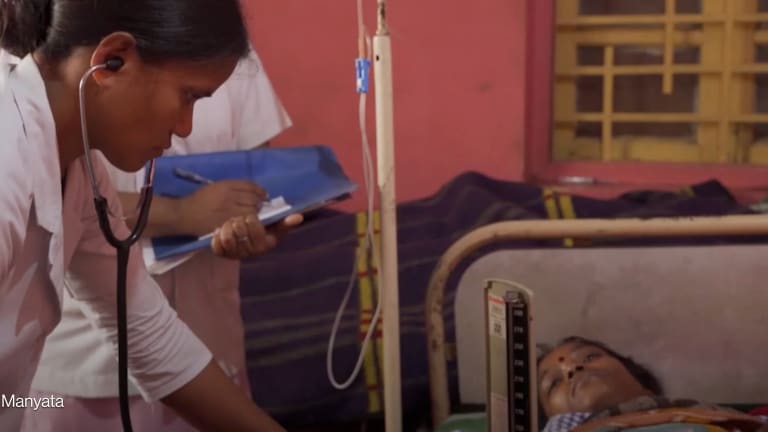
Late on a June night, in a small maternity facility in Deoghar, a city in Jharkhand state, India, a new mother started to bleed heavily. She had given birth to a healthy baby boy just a few hours earlier. Promila Hansda, the staff nurse on duty, spotted the postpartum hemorrhage — excessive bleeding — almost immediately and started intravenous therapy with the required dose of oxytocin to stem the blood flow. As another colleague massaged the mother’s uterus, Hansda removed the clots that were causing the bleeding and administered a tablet of misoprostol to further prevent the blood loss and prepared for a transfusion.
This young nurse — who had been trained through the Manyata program, a quality improvement and certification program for private health care facilities offered by the Federation of Obstetrics and Gynaecological Societies of India — at a modest 15-bed private maternity facility, saved the new mother's life.
Launched in 2013, the Manyata program — which is designed to deliver high-quality, respectful care to women during and after childbirth — responded to a glaring need to address quality in private maternity facilities.
“At a time when health care systems are overstretched in dealing with the COVID-19 pandemic, the skills, competence, and confidence of front-line health care workers ... in ensuring that women and newborns continue to get quality care, is invaluable.”
—In India, almost 50% of institutional births occur in private facilities — many of them small like the Parwati Matri Sadan where Hansda works — yet no national system existed to ensure quality among private providers. Manyata bridges this gap, ensuring that well-trained health care providers deliver a respectful and safe experience for mothers during childbirth, while upholding the best clinical practices.
As of July 2020, there are more than 700 Manyata-certified facilities, of which over 400 have received quality improvement support from Jhpiego — a global health leader and Johns Hopkins University affiliate. An additional 300 are enrolled and working toward ensuring no woman dies during childbirth.
With support from MSD for Mothers, and in partnership with FOGSI, Jhpiego has been working with private facilities in the states of Uttar Pradesh, Jharkhand, and Maharashtra to build skills, confidence, and resilience while preparing facilities for Manyata certification.
At a time when health care systems are overstretched in dealing with the COVID-19 pandemic, the skills, competence, and confidence of front-line health care workers and hospital preparedness in ensuring that women and newborns continue to get quality care, is invaluable.
Dr. Neha Priya, the physician in-charge at Parwati Matri Sadan, said that Hansda and others on her staff have become more confident and competent in handling postpartum care since Manyata, which emphasizes routine checks and quality care throughout each client’s stay.
“If this case would have happened before the Manyata training, then maybe the client would have continued to bleed on the bed, and [I would only have discovered it] when I would have gone for my rounds at 6 a.m. the next morning,” she said.
“Up to delivery, everybody is alert, but after delivery people begin to ignore the patient as the delivery has happened [and they move to] the next patient. But [postpartum care] has improved a lot at my facility because of Manyata, and for this we’d like to thank the program,” the doctor added.
Maternal care amid COVID-19
India’s national maternal mortality rate is 113 per 100,000 live births — higher than the SDG target of 70. Even under normal circumstances, a mother and her baby are most vulnerable during childbirth. But the COVID-19 pandemic has significantly increased the risk for pregnant and breastfeeding mothers and their infants, possibly threatening the progress India has made toward reducing maternal mortality to date.
Parwati Matri Sadan’s investment in continuous quality improvement and support from the Manyata team in establishing its COVID-19 preparedness protocols has kept the facility ahead of the curve in its response to the pandemic.
In the early days of COVID-19 in India, despite numerous global and national guidelines for pregnant, laboring, and breastfeeding women, many health care facilities were unsure how to provide care for new mothers and their newborns safely.
By the first week of March, Jhpiego had orientated the staff of Manyata-registered and certified facilities to prepare them for COVID-19. This comprehensive orientation delivered virtually, focused on infection prevention and control measures while upholding the principles of respectful maternity care, and was followed by skills updates and discussion forums. Nearly 1,000 doctors and nurses participated in COVID-19 briefings across 248 Manyata facilities in the three states.
“Through Manyata, we have received full support and information . . . My staff’s fear was removed because of this. They knew how to look for signs of COVID, and prevent infections from spreading,” said Priya.
Lessons learned informing plans to scale
Through cyclical monitoring and evaluation, the Manyata program has provided insight into its influence and sustainability by analyzing what factors contribute to its success.
The program has shown that physician-led private practices are willing to measure and report the quality of their care. In fact, only 3.5% of providers dropped out of the program over three years – an important component of Manyata’s success and sustainability.
Evaluation of Manyata’s process has also provided insight into the role of various health system stakeholders. Nurses, for example, are essential in driving quality improvement, including motivating obstetricians to take it on; and professional associations play an influential role in measuring, improving and assuring the quality of private care.
Peer assessment — coupled with public recognition of providers who achieve quality standards — is a reliable and effective way to assure the quality of private maternity care.
The next step involves collaboration to bring this scalable model to new states and providers and expand access to quality standards and measurement tools.
Several Jhpiego program team members also contributed to this story: Sinimol KJ, program officer; Dr. Kunal Pise, state program manager in Maharashtra; Dr. Meshach Sunny Kujur, state program officer; and Neel Kashmi Kujur, program officer in Jharkhand.
The Funding the Future series is supported by funding from MSD, through its MSD for Mothers program and is the sole responsibility of the authors. MSD for Mothers is an initiative of Merck & Co., Inc., Kenilworth, NJ, U.S.A.










